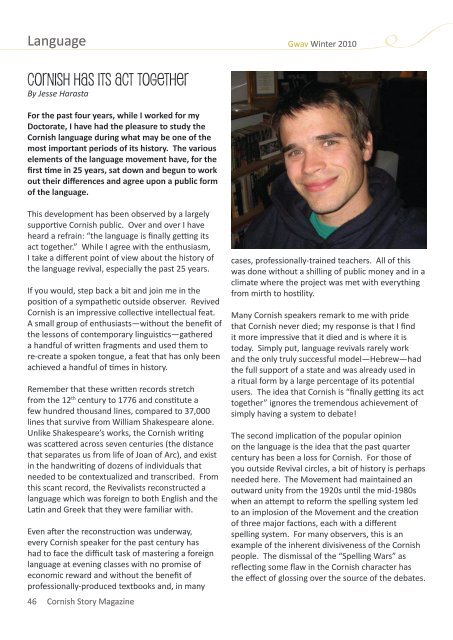The Real Cornish Online Magazine - Cornish Story
The Real Cornish Online Magazine - Cornish Story
The Real Cornish Online Magazine - Cornish Story
- No tags were found...
Create successful ePaper yourself
Turn your PDF publications into a flip-book with our unique Google optimized e-Paper software.
LanguageGwav Winter 2010Gwav Winter 2010Language<strong>Cornish</strong> Has its Act TogetherBy Jesse HarastaFor the past four years, while I worked for myDoctorate, I have had the pleasure to study the<strong>Cornish</strong> language during what may be one of themost important periods of its history. <strong>The</strong> variouselements of the language movement have, for thefirst time in 25 years, sat down and begun to workout their differences and agree upon a public formof the language.This development has been observed by a largelysupportive <strong>Cornish</strong> public. Over and over I haveheard a refrain: “the language is finally getting itsact together.” While I agree with the enthusiasm,I take a different point of view about the history ofthe language revival, especially the past 25 years.If you would, step back a bit and join me in theposition of a sympathetic outside observer. Revived<strong>Cornish</strong> is an impressive collective intellectual feat.A small group of enthusiasts—without the benefit ofthe lessons of contemporary linguistics—gathereda handful of written fragments and used them tore-create a spoken tongue, a feat that has only beenachieved a handful of times in history.Remember that these written records stretchfrom the 12 th century to 1776 and constitute afew hundred thousand lines, compared to 37,000lines that survive from William Shakespeare alone.Unlike Shakespeare’s works, the <strong>Cornish</strong> writingwas scattered across seven centuries (the distancethat separates us from life of Joan of Arc), and existin the handwriting of dozens of individuals thatneeded to be contextualized and transcribed. Fromthis scant record, the Revivalists reconstructed alanguage which was foreign to both English and theLatin and Greek that they were familiar with.Even after the reconstruction was underway,every <strong>Cornish</strong> speaker for the past century hashad to face the difficult task of mastering a foreignlanguage at evening classes with no promise ofeconomic reward and without the benefit ofprofessionally-produced textbooks and, in manycases, professionally-trained teachers. All of thiswas done without a shilling of public money and in aclimate where the project was met with everythingfrom mirth to hostility.Many <strong>Cornish</strong> speakers remark to me with pridethat <strong>Cornish</strong> never died; my response is that I findit more impressive that it died and is where it istoday. Simply put, language revivals rarely workand the only truly successful model—Hebrew—hadthe full support of a state and was already used ina ritual form by a large percentage of its potentialusers. <strong>The</strong> idea that <strong>Cornish</strong> is “finally getting its acttogether” ignores the tremendous achievement ofsimply having a system to debate!<strong>The</strong> second implication of the popular opinionon the language is the idea that the past quartercentury has been a loss for <strong>Cornish</strong>. For those ofyou outside Revival circles, a bit of history is perhapsneeded here. <strong>The</strong> Movement had maintained anoutward unity from the 1920s until the mid-1980swhen an attempt to reform the spelling system ledto an implosion of the Movement and the creationof three major factions, each with a differentspelling system. For many observers, this is anexample of the inherent divisiveness of the <strong>Cornish</strong>people. <strong>The</strong> dismissal of the “Spelling Wars” asreflecting some flaw in the <strong>Cornish</strong> character hasthe effect of glossing over the source of the debates.At the heart of the past 25 years of discussion hasbeen the existence of real, important questionsabout what it means to be <strong>Cornish</strong> and in whatdirection the language should move. While Iagree that the past decades have taken a tollupon the language—in the loss of speakers,potential students and public esteem—I donot believe that they have been “lost.” In fact,the factions threw themselves into the projectof using <strong>Cornish</strong>, producing what may be seensome day as a golden age of literature, analysisand critique. During this period the discussionabout the Language truly matured and drew uponinternational debates about the role of languageand the effect of ideology upon the way we speakand write. Rather than arguing that <strong>Cornish</strong> neverdied, I believe that the <strong>Cornish</strong> should be trulyproud of this Revival and see it as perhaps one oftheir greatest achievements, comparable to theirmining heritage.I believe that the language stands in a goodposition to move from being primarily anintellectual project to becoming what it aimsto be: a language used by people as a mediumof communication. While <strong>Cornish</strong> lacks sometechnical vocabulary, it is perfectly capable ofperforming the most crucial task of a language:being a carrier of the emotions and dreams ofits users. <strong>The</strong> language, with its growing publicpresence, internal unity and robust intellectualarenas, is ready to make that leap.Jesse is a cultural and linguistic anthropologiststudying for a doctorate out of Syracuse Universityin Upstate New York. He has spent the last threesummers in Cornwall doing research for an MAand is currently based out of Camborne. Hisresearch interest is in the cultural politics ofminority languages and ethnicities. He is studyingthe <strong>Cornish</strong> Language and hopes to producea study that will be useful to both people inCornwall and those who work in language revivalmovements around the globe. He loves a goodpasty (chopped beef only, no mince, please!), butmisses breakfasts of pancakes smothered with realNew York maple syrup.Here are some fabulous <strong>Cornish</strong> phrases...Nadelik Lowen! Merry Christmas!Ha AndBledhen Nowyth Da!Happy New Year!Gorhemynadow a’n Seson Season’s GreetingsGorhemynadow dhyworth Kernow Greetingsfrom CornwallPub Bolonjedh Da rag 2011! All GoodWishes for 2011!Dhe To(Name) hweg Dear (name)Gans kerensa With loveGorhemynadow a’n gwella Best wishesGwedhen Nadelik Christmas treeRoyow Nadelik Christmas presentsTas Nadelik Father ChristmasRudolf an Karow Ergh Tron-Rudh Rudolfthe Red-Nosed ReindeerKelyn HollyYdhyow IvyUhelvar MistletoeEl AngelDen Ergh Snowman46 <strong>Cornish</strong> <strong>Story</strong> <strong>Magazine</strong><strong>Cornish</strong> <strong>Story</strong> <strong>Magazine</strong> 47


